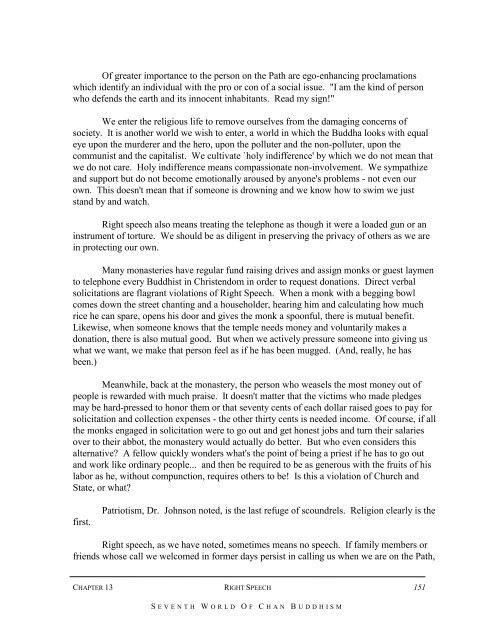seventh world of chan buddhism - Zen Buddhist Order of Hsu Yun
seventh world of chan buddhism - Zen Buddhist Order of Hsu Yun
seventh world of chan buddhism - Zen Buddhist Order of Hsu Yun
Create successful ePaper yourself
Turn your PDF publications into a flip-book with our unique Google optimized e-Paper software.
Of greater importance to the person on the Path are ego-enhancing proclamations<br />
which identify an individual with the pro or con <strong>of</strong> a social issue. "I am the kind <strong>of</strong> person<br />
who defends the earth and its innocent inhabitants. Read my sign!"<br />
We enter the religious life to remove ourselves from the damaging concerns <strong>of</strong><br />
society. It is another <strong>world</strong> we wish to enter, a <strong>world</strong> in which the Buddha looks with equal<br />
eye upon the murderer and the hero, upon the polluter and the non-polluter, upon the<br />
communist and the capitalist. We cultivate `holy indifference' by which we do not mean that<br />
we do not care. Holy indifference means compassionate non-involvement. We sympathize<br />
and support but do not become emotionally aroused by anyone's problems - not even our<br />
own. This doesn't mean that if someone is drowning and we know how to swim we just<br />
stand by and watch.<br />
Right speech also means treating the telephone as though it were a loaded gun or an<br />
instrument <strong>of</strong> torture. We should be as diligent in preserving the privacy <strong>of</strong> others as we are<br />
in protecting our own.<br />
Many monasteries have regular fund raising drives and assign monks or guest laymen<br />
to telephone every <strong>Buddhist</strong> in Christendom in order to request donations. Direct verbal<br />
solicitations are flagrant violations <strong>of</strong> Right Speech. When a monk with a begging bowl<br />
comes down the street <strong>chan</strong>ting and a householder, hearing him and calculating how much<br />
rice he can spare, opens his door and gives the monk a spoonful, there is mutual benefit.<br />
Likewise, when someone knows that the temple needs money and voluntarily makes a<br />
donation, there is also mutual good. But when we actively pressure someone into giving us<br />
what we want, we make that person feel as if he has been mugged. (And, really, he has<br />
been.)<br />
Meanwhile, back at the monastery, the person who weasels the most money out <strong>of</strong><br />
people is rewarded with much praise. It doesn't matter that the victims who made pledges<br />
may be hard-pressed to honor them or that seventy cents <strong>of</strong> each dollar raised goes to pay for<br />
solicitation and collection expenses - the other thirty cents is needed income. Of course, if all<br />
the monks engaged in solicitation were to go out and get honest jobs and turn their salaries<br />
over to their abbot, the monastery would actually do better. But who even considers this<br />
alternative? A fellow quickly wonders what's the point <strong>of</strong> being a priest if he has to go out<br />
and work like ordinary people... and then be required to be as generous with the fruits <strong>of</strong> his<br />
labor as he, without compunction, requires others to be! Is this a violation <strong>of</strong> Church and<br />
State, or what?<br />
first.<br />
Patriotism, Dr. Johnson noted, is the last refuge <strong>of</strong> scoundrels. Religion clearly is the<br />
Right speech, as we have noted, sometimes means no speech. If family members or<br />
friends whose call we welcomed in former days persist in calling us when we are on the Path,<br />
CHAPTER 13 RIGHT SPEECH<br />
S EVENTH W ORLD O F C HAN B UDDHISM<br />
151


